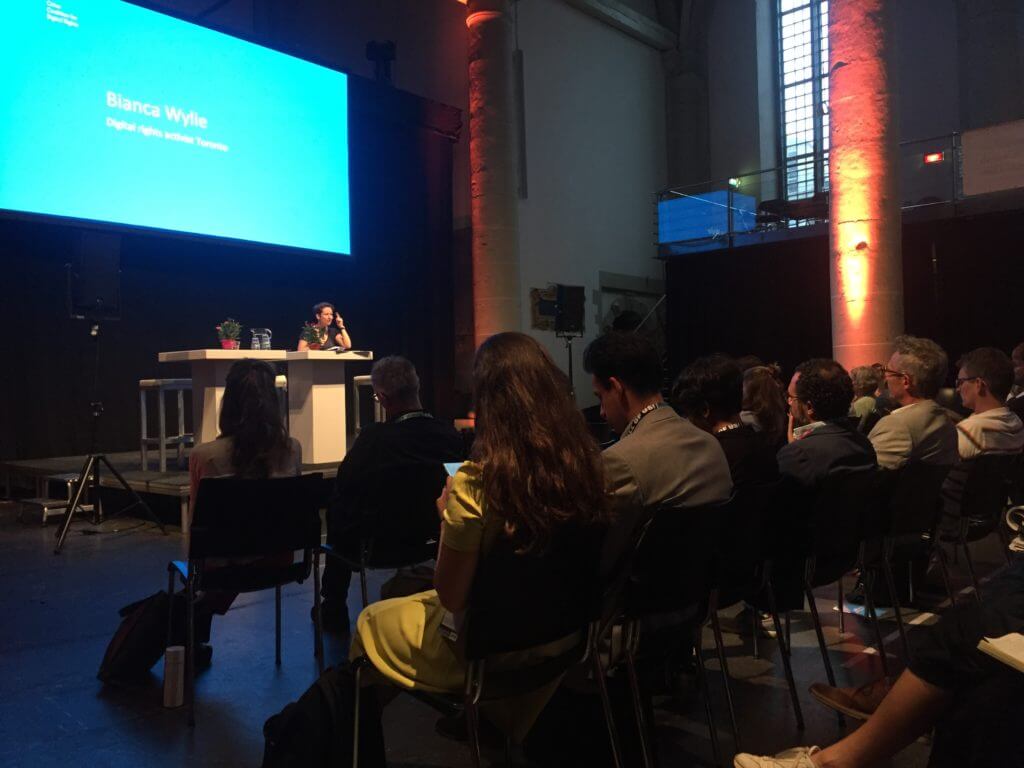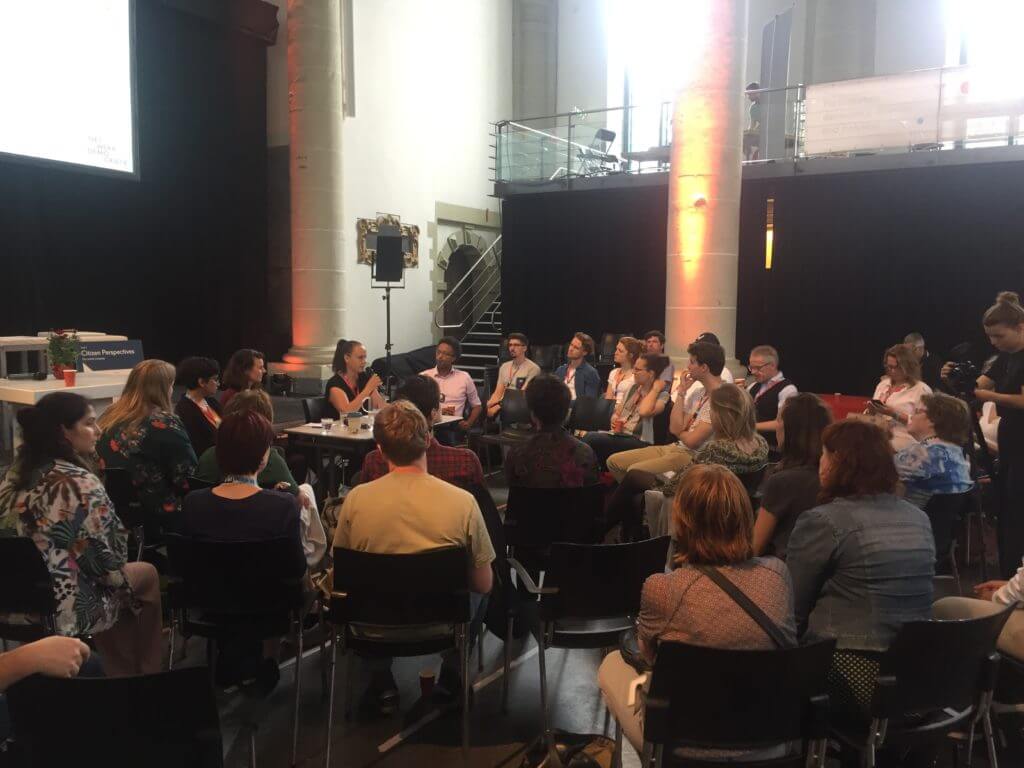Written by Mercedes Mercedes-Mercedes
In 2020 the EU charter of Fundamental Rights are 20 years old. With the ‘Connect Europe’ project Netwerk Democratie partners with six different civil society organisations based in different European countries, to celebrate and discuss our fundamental rights. We are looking at the charter from different perspectives and discussing its relevance today.
During the international Cities for Digital Rights conference Netwerk Democratie organised the afternoon program ‘Free City, Free Citizens’ on citizens’ perspectives on the right to freedom in the digital city. The main question was ‘what do we need to move freely in the digital society?”. On the one hand the digital realm gives space for free speech, on the other hand one may ask when free speech becomes propaganda or hate speech, and how does one regulate or prevent this? Similarly, security cameras in the streets are often defended under the claim that it is for public safety; but what if the result is that citizens are surveilled rather than protected? The event was opened with a keynote speech by digital rights activist Bianca Wylie and followed by a conversation with several European civil society organizations, academics and citizens who shared their concerns on the rights to freedom in a digital society.

Bianca Wylie is the founder of Tech Reset Canada and in her speech she discussed the challenges that digital democracy will face in the years to come. Democracy is perceived to provide freedom but historically and in practice it is clouded with violence, white supremacy, racism and sexism. As such, when establishing and expanding digital democracy, Wylie emphasizes the need for awareness regarding current issues in democracy instead of blindly adapting a flawed system unto the digital realm.
“What really matters is that we don’t try to solve a problem at the edge of a problem, but that we need to solve it at its core. Injustice, social inequity will not be solved through any sort of tech fix, we know this.” – Bianca Wylie
She brings up a story about Sidewalks Labs, a company that has invested $15 million in order to build a smart neighborhood in Toronto. Wylie highlights how problematic it is for a private corporation to plan the building of a neighborhood without a clear role of the government or a democratic process, in which the citizens are asked what they want. Wylie explained: “when a company spends so much money within your community to make something, it took consent off the table.” Incidents like this should be prevented when building a digital democratic society.
This was also of concern to the speakers of the panel discussion who found that technology is an increasingly important component of democracy and citizenship because citizen can use the digital space to make their voices heard and gain information about ongoing processes. As one of the speakers of the event, Namita Kambli, researcher and project manager at The Democratic Society, argued that technology offers the opportunity to improve democracy, but democracy also needs to evolve in response to the new challenges that technology brings. Digital rights are an important part of this.
One aspect that was found to be particularly important with the advancement of the digital society is to create an ethically just and inclusive digital space. Speaker Lotte Houwing works at Bits of Freedom, an organization that focuses on digital human rights. For Houwing it is of relevance to be able to enact your human rights in the digital space, such as freedom of speech, right to assemble and right to stay anonymous. Rights are especially important when technology is used in public spaces. Are citizens for example aware that they are being monitored and have they given their consent? Furthermore, why, from whom and to what purpose are they being monitored, tracked or even recorded. Houwing brings up an example of “nudging” in Eindhoven. Nudging is when, for example governments, use technology for public order by influencing the surroundings to de-escalate a conflict without having to involve the police. This is done for example by trying to calm people with music, smells or lights. However, Houwing questions who is in the decision-making process and for what ends, as she finds that citizens are often not included in such processes.
“It should be about public values. I really missed public values in this regard, or citizen interests. It is dangerous because it is nudging in the sense that people react on to the technological shifts but are not really informed.” – Lotte Houwing

Digital rights are also about digital skills and properly informing citizens. All of the speakers agreed that informing and educating people on how, why and what for people’s data is being collected, analyzed, stored and used is important and necessary. For example, to already start teaching children “digital literacy” would be a great way for people to understand and use this information correctly from a young age.
“I totally agree with educating the young as well as the adults. And I think that the adults also include decision makers, because how do you make decisions without actually understanding what it entails. So what we push for is digital literacy, which has the goal to educate people and make them aware on the societal impact of technology. This is beyond just literacy, being able to use something, but also to understand the consequences of that technology.” – Namita Kambli
Dr. Sennay Ghebreab highlights the importance of data and who is included in this. According to Ghebreab, data sets and AI actually reflects how our societies operate and think. Inequality through algorithms show persisting discrimination through biased data input. For example, during his research Ghebreab found that AI technology was less likely or unable to recognize the face of black people. Lisbon Portuguese Women rights organization, provided another example of offline inequality continuing in the online realm, namely 70% of the women that are often stalked online also experience physical abuse offline. Hence, this quote by Sennay Ghebreab is particularly relevant:
“We should not throw away the data because this is a reflection of society. It is an image of reality. You should account for it, you should correct it. Not only in a technological manner but also in a civil society manner. We need to learn that what AI is showing us is a mirror. Correct it in ways that are not only technical but also impactful for society.”- Dr. Sennay Ghebreab
Citizens being properly informed, educated and included is important but Ghebreab points out that it is not enough: cooperation and the exchange of information between the different parties is also necessary. All too often different parties are working on the same issue on their own instead of collaborating.
“So, we are discussing the topic of rights and digital rights, universal rights, but we are not connected with each other. We are all working in our silo’s. As long as that happens we will converge to local and temporary solutions.”- Sennay Ghebreab
This might be rendered more challenging with the rise of fake news, hate and propaganda. While these things have always existed, current technology allows them to be spread faster and to more people. It is highlighted by the speakers how the far right especially uses the digital space to advance and spread their beliefs. Especially, “monopoly” platforms like Youtube, Google or Facebook, seem to be a great hindrance for establishing decent digital human rights, as these organizations have their own agendas. But this is where Ghebreab highlights the importance of civic engagement, in which citizens are not mere bystanders but actively work alongside these seemingly all-powerful tech companies and create a digital society in which AI can help create an equal society.
“I think we are at this fork in the road, and we can take our democracies and really come together to strengthen them and to built out. Or the corporate control and the seating of the power to corporations is going to become a problem.” – Bianca Wylie
More information on the project: www.eurights.org



